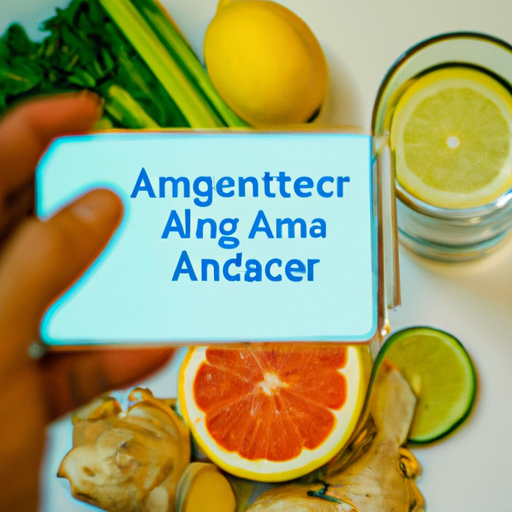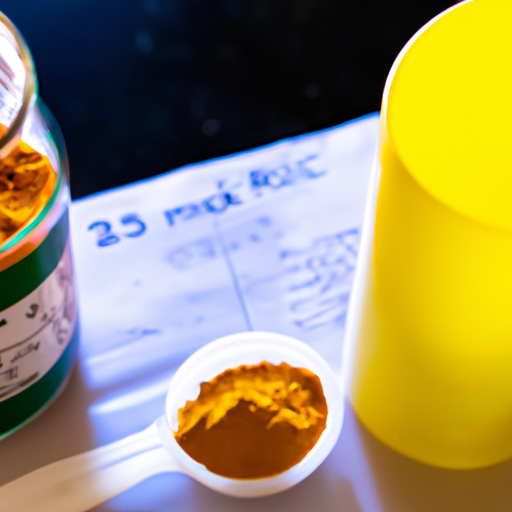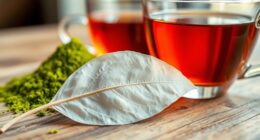As an individual who has dealt with acid reflux for an extended period of time, I recognize the significance of discovering the correct beverage to alleviate unpleasant symptoms. Acid reflux happens when stomach acid moves back up into the esophagus, resulting in a burning feeling in the chest and throat.
While there are many factors that can trigger acid reflux, including certain foods and lifestyle habits, the beverages we consume can play a significant role in managing symptoms.
In this article, I will guide you through the best and worst drinks for acid reflux and share tips for managing symptoms. Whether you are looking for a refreshing drink to quench your thirst or want to enjoy a cocktail without the discomfort of acid reflux, this article will provide evidence-based information to help you make informed choices about what you drink.
Let’s explore the world of drinks and find the best options for managing acid reflux symptoms.
Key Takeaways
- Water is the best drink for acid reflux as it neutralizes stomach acid and helps with hydration which is important in managing symptoms.
- Alcoholic and caffeinated beverages should be limited or avoided as they can exacerbate symptoms.
- Herbal teas like ginger and chamomile can soothe digestive issues and reduce inflammation, making them great options for easing acid reflux symptoms.
- Over-consumption of any beverage should be avoided, and portion control is important to prevent worsening of symptoms.
Understanding Acid Reflux
If you’re experiencing acid reflux, it’s important to understand what’s happening in your body. Acid reflux, also known as gastroesophageal reflux disease (GERD), occurs when stomach acid flows back up into the esophagus. This happens because the lower esophageal sphincter (LES), which acts as a valve between the stomach and esophagus, doesn’t close properly.
Causes of acid reflux can include certain foods, such as spicy or fatty foods, as well as lifestyle factors like smoking, being overweight, and eating large meals before bedtime. Symptoms of acid reflux can include heartburn, regurgitation, and chest pain.
It’s important to note that while occasional acid reflux is common, chronic acid reflux can lead to complications such as esophagitis, Barrett’s esophagus, and even esophageal cancer. That’s why it’s crucial to seek medical attention if you experience persistent acid reflux symptoms.
With that being said, managing acid reflux can involve making lifestyle changes, such as avoiding trigger foods and maintaining a healthy weight.
Now, let’s explore the importance of hydration in managing acid reflux.
The Importance of Hydration
As someone who experiences acid reflux, I’ve learned the importance of hydration in managing my symptoms. Choosing the right beverages can make a significant difference in how I feel throughout the day.
Not only do I need to avoid drinks that trigger my acid reflux, but I also need to ensure that I’m staying hydrated to avoid dehydration, which can exacerbate my symptoms.
Choosing the Right Beverages
When it comes to acid reflux, selecting the appropriate drink is like finding a key to a locked door; it can make all the difference in the world. Here are four things to keep in mind when choosing the right beverages:
-
Limit alcohol consumption: Alcohol can irritate the lining of the stomach and increase acid production, leading to more frequent and severe acid reflux symptoms. If you do choose to drink alcohol, limit your intake and avoid mixing alcohol with other acidic or carbonated drinks.
-
Cut back on caffeine: Caffeine can also irritate the lining of the stomach and increase acid production. Try switching to decaf coffee or tea, or limit your caffeine intake to earlier in the day.
-
Opt for water: Water is the best drink for those with acid reflux. It helps neutralize stomach acid and keep the digestive system functioning properly. Aim for at least eight glasses of water a day, and sip on water throughout the day to stay hydrated.
-
Consider herbal tea: Certain herbal teas, such as ginger and chamomile, have been shown to soothe digestive issues and reduce inflammation in the stomach. Try incorporating them into your daily routine to see if they help alleviate your acid reflux symptoms.
Choosing the right beverages can make a big difference in managing your acid reflux symptoms. However, it’s not just about what you drink, but also how much you drink.
In the next section, we’ll explore the importance of avoiding dehydration and how it can affect your digestive health.
Avoiding Dehydration
Staying hydrated is crucial for managing digestive health and avoiding discomfort caused by dehydration. Acid reflux attacks can exacerbate dehydration, making it essential to stay hydrated during these episodes. When the acid in the stomach moves back up into the esophagus, it can cause irritation and inflammation, leading to discomfort and pain. Drinking water can help to dilute the acid and alleviate these symptoms.
Preventing dehydration is not only crucial during acid reflux attacks but also for overall digestive health. Dehydration can lead to constipation, bloating, and other digestive issues, making it important to drink plenty of fluids throughout the day.
In addition to water, individuals can consume other hydrating beverages such as coconut water, herbal teas, and low-sugar sports drinks. These drinks can also help to replenish electrolytes lost during acid reflux attacks. With proper hydration, individuals can manage their acid reflux symptoms and improve their overall digestive health.
Moving forward, let’s discuss the best drinks for acid reflux.
Best Drinks for Acid Reflux
The top choice for easing acid reflux symptoms is undoubtedly ginger tea, which not only soothes the stomach but also adds a comforting warmth to the experience. Ginger has natural anti-inflammatory properties that help reduce inflammation in the gut, and it also has a calming effect on the stomach muscles. This makes it an excellent option for those looking to ease acid reflux symptoms.
Additionally, ginger tea is an alkaline drink, which means it can help neutralize stomach acid and reduce the risk of reflux. Another great option for those looking to ease acid reflux symptoms is chamomile tea. Chamomile has been found to have a soothing effect on the stomach and can help reduce inflammation.
Drinking chamomile tea before bed may also help promote better sleep, which is essential for managing acid reflux symptoms. Like ginger tea, chamomile tea is also an alkaline drink, making it a great option for those looking to neutralize stomach acid.
While ginger tea and chamomile tea are great options for those looking to ease acid reflux symptoms, there are also some drinks that should be avoided. In the next section, we’ll discuss the worst drinks for acid reflux and why they should be avoided.
Worst Drinks for Acid Reflux
Avoiding certain beverages is crucial for managing acid reflux symptoms effectively. One of the worst drinks for acid reflux is coffee. Coffee is a highly acidic beverage that can irritate the lining of the stomach and cause acid reflux symptoms. The caffeine in coffee also stimulates the production of stomach acid, which can further exacerbate acid reflux symptoms. If you’re a coffee lover, consider switching to a low-acid coffee or a caffeine-free alternative.
Another beverage to avoid if you have acid reflux is alcohol. Alcohol can relax the lower esophageal sphincter, which is the muscle that controls the flow of food and acid between the stomach and esophagus. This relaxation can allow stomach acid to flow back up into the esophagus, causing heartburn and other acid reflux symptoms. If you do choose to drink alcohol, limit your intake and avoid mixing alcohol with other acid reflux triggers such as caffeine and citrus juices.
In order to effectively manage acid reflux symptoms, it’s important to make lifestyle changes and avoid trigger foods and beverages. One of the best ways to manage acid reflux is to make healthy dietary choices, such as choosing low-acid beverages and replacing trigger foods with healthier alternatives.
Tips for Managing Acid Reflux Symptoms
Now that we know the types of drinks to avoid for acid reflux, let’s focus on managing the symptoms.
One of the most effective ways to manage acid reflux is by adjusting our sleeping position. It’s recommended to sleep on your left side as it can help keep stomach acid from flowing back into the esophagus. Additionally, it’s essential to elevate your head while sleeping to reduce acid reflux symptoms. By using pillows or a wedge, you can elevate your head by at least six inches to prevent stomach acid from traveling up the esophagus while sleeping.
Aside from adjusting our sleeping position, dietary changes are also necessary to manage acid reflux symptoms. It’s crucial to eat smaller and more frequent meals as overeating can lead to acid reflux symptoms. Additionally, avoiding trigger foods such as spicy and acidic foods can help reduce the symptoms.
Instead, incorporating anti-inflammatory ingredients in our diet like ginger and turmeric can help soothe the digestive system and alleviate acid reflux symptoms.
In the next section, we’ll discuss how to incorporate anti-inflammatory ingredients in our diet to manage acid reflux symptoms effectively.
Incorporating Anti-Inflammatory Ingredients
Let’s explore how we can incorporate ingredients that soothe inflammation in our diet and help manage those pesky symptoms. Anti-inflammatory benefits can be found in various herbs and spices, such as ginger and turmeric. Ginger has been shown to reduce inflammation in the gut, while turmeric contains curcumin, which has powerful anti-inflammatory properties. Adding these ingredients to your meals can help alleviate discomfort caused by acid reflux.
To make it easier for you to incorporate anti-inflammatory ingredients into your diet, here’s a table of some common herbs and spices that can aid in managing acid reflux symptoms:
| Herb/Spice | Anti-Inflammatory Benefits |
|---|---|
| Ginger | Reduces inflammation in the gut |
| Turmeric | Contains curcumin, a powerful anti-inflammatory |
| Cinnamon | Can help relieve heartburn |
| Fennel | Can help reduce bloating and gas |
By incorporating these herbs and spices into your meals, you can experience relief from acid reflux symptoms. However, it’s important to note that portion control is also crucial in managing acid reflux.
Importance of Portion Control
Portion control is critical when it comes to managing acid reflux symptoms. As someone who experiences acid reflux, I know firsthand how easy it is to overdo it on beverages that can trigger symptoms.
It’s important to measure our beverage intake and avoid over-consumption to help prevent acid reflux symptoms from flaring up.
Measuring Beverage Intake
Track your beverage consumption by keeping a record of the amount of liquid you drink each day. Hydration tracking is essential in keeping acid reflux at bay. By measuring how much liquid you intake, you’ll have a clear idea of your beverage consumption habits and will be able to monitor if you’re drinking too much or too little.
One effective method is to use a water bottle with measurements marked on it, allowing you to track how much you’ve had to drink throughout the day. Another option is to keep a journal or use an app to log your fluid intake. By staying aware of your beverage intake, you’ll be able to make adjustments as needed, such as reducing the amount of acidic drinks or increasing water consumption.
With consistent monitoring, you’ll be able to maintain a healthy beverage intake and keep acid reflux symptoms at bay.
It’s important to avoid over-consumption, as this can worsen acid reflux symptoms.
In the next section, we’ll discuss the importance of avoiding over-consumption and ways to maintain portion control.
Avoiding Over-Consumption
You might be surprised to learn that eating slowly can actually help alleviate symptoms associated with over-consumption, such as bloating and discomfort. When we eat too quickly, we tend to consume more food than we actually need, leading to overeating and digestive issues.
Taking smaller bites, chewing slowly, and putting down the utensil between bites can all help you eat more mindfully and in moderation. In addition to eating slowly, it’s important to pay attention to portion sizes and practice moderation when it comes to consuming beverages.
This is especially important for those who suffer from acid reflux, as over-consumption of certain beverages can exacerbate symptoms. By being mindful of how much you are drinking, you can avoid discomfort and protect your digestive system.
Transitioning into maintaining a healthy diet, it’s important to not only watch what you drink, but also what you eat.
Maintaining a Healthy Diet
Eating a balanced and nutritious diet can help reduce the frequency of acid reflux symptoms. Incorporate healthy snacking and meal planning into your daily routine to promote better digestion and overall health.
When it comes to healthy snacking, opt for foods that are low in fat and high in fiber, such as fruits, vegetables, and whole grains. These foods can help regulate digestion and prevent excess acid production in the stomach.
To plan meals effectively, avoid trigger foods that can exacerbate acid reflux symptoms, such as spicy and acidic foods, caffeine, and alcohol. Instead, focus on incorporating lean proteins, complex carbohydrates, and healthy fats into your meals.
Eating smaller, more frequent meals throughout the day can help prevent overeating and reduce the likelihood of experiencing acid reflux. By making these simple dietary changes, you can take control of your acid reflux symptoms and promote better digestive health.
If symptoms persist, it’s important to seek medical advice to rule out any underlying conditions or complications.
Seeking Medical Advice
If persistent discomfort and pain continue even after making dietary changes, it’s time to consult a medical professional for further diagnosis and treatment options. Your physician may recommend lifestyle modifications, such as reducing stress levels and avoiding trigger foods, or prescribe medication to manage acid reflux symptoms.
It’s important to follow your doctor’s recommendations and regularly schedule check-ups to monitor your condition.
In addition to consulting your physician, you may also explore alternative therapies to complement medical treatment. These may include acupuncture, relaxation techniques, and herbal remedies. However, it’s important to note that some alternative therapies may not be backed by scientific evidence and may not be appropriate for everyone.
Always consult with a licensed healthcare professional before trying any alternative therapies. Together with your physician, you can develop a comprehensive treatment plan that addresses your individual needs and improves your quality of life.
Frequently Asked Questions
Are there any natural remedies for acid reflux that can be consumed as a drink?
Oh, yes, because when I think of natural remedies for acid reflux, my mind immediately goes to drinks. Herbal teas like chamomile and ginger can help, as well as Aloe Vera juice. Just be sure to check with your doctor first.
Can drinking water during meals worsen acid reflux symptoms?
Drinking water during meals can contribute to acid reflux symptoms by diluting stomach acid and slowing digestion. Adequate hydration is important, but it’s best to drink water between meals rather than during.
Is it safe to consume carbonated drinks if you suffer from acid reflux?
I used to love carbonated drinks, but since my acid reflux diagnosis, I’ve had to explore alternative beverages for relief. Carbonated drinks can exacerbate symptoms, so it’s best to avoid them.
Can drinking alcohol lead to acid reflux symptoms?
As someone with acid reflux, I’ve found that drinking alcohol can certainly trigger symptoms. It’s best to avoid it altogether or limit consumption. Natural remedies like ginger or chamomile tea may offer relief.
Does the temperature of the drink affect acid reflux symptoms?
Hot vs cold: which temperature is best for acid reflux relief? While there’s no one-size-fits-all answer, hot drinks like herbal infusions can provide soothing relief. However, it’s important to avoid drinks that are too hot or too cold, as extreme temperatures can aggravate symptoms.
Conclusion
In conclusion, managing acid reflux requires a holistic approach that involves lifestyle changes, diet modifications, and medical intervention. It’s essential to stay hydrated and choose the right drinks that don’t exacerbate the symptoms. Incorporating anti-inflammatory ingredients and maintaining portion control can also help alleviate acid reflux symptoms.
To use an allegory, managing acid reflux is like building a sturdy house. You need a strong foundation of healthy habits, reinforced by a balanced diet, and supported by medical guidance. Neglecting any aspect of the process can lead to a weak structure that crumbles under the slightest pressure.
By following the guidelines outlined in this article, you can build a robust defense against acid reflux and enjoy a comfortable, healthy life.










